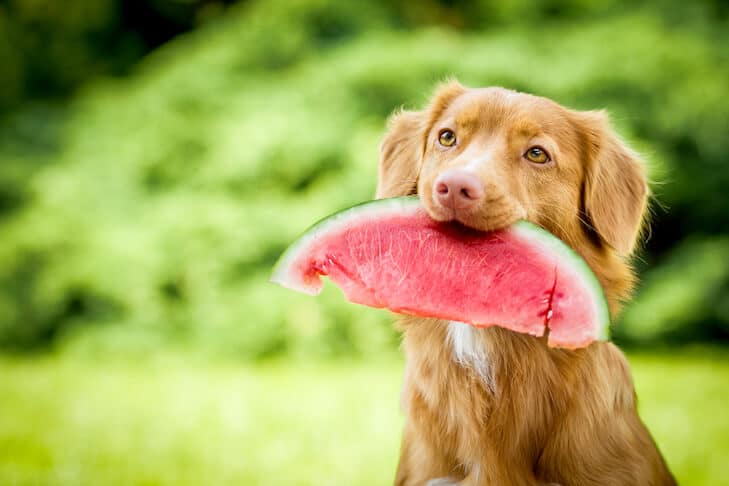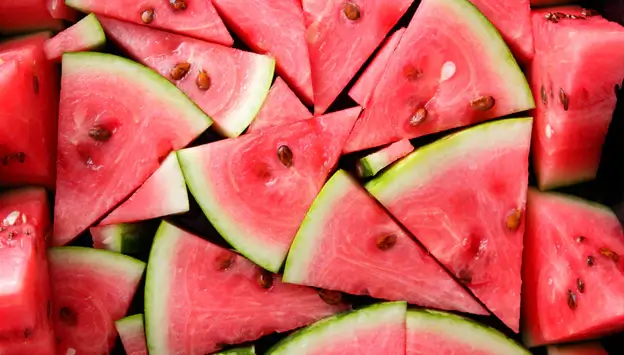Watermelon serves as a refreshing treat for dogs when prepared properly. This hydrating fruit contains essential vitamins and minerals that can benefit canine health, but specific precautions must be taken regarding seeds, rinds, and portion control.
The high water content (approximately 92%) makes watermelon particularly valuable for hydration during warm weather, while the low calorie content (about 30 calories per 100g) makes it suitable for weight-conscious pets.
Understanding proper preparation methods and serving sizes ensures dogs can enjoy this fruit safely while avoiding potential digestive issues or other health concerns.

Table of Contents
How Can Dogs Have Watermelon?
The fleshy red interior of watermelon is perfectly safe for canine consumption when properly prepared.
This sweet portion contains essential vitamins and minerals while providing hydration due to its 92% water content.
However, the green rind and seeds present significant hazards that require careful attention.

The tough, fibrous rind can cause intestinal blockages, while seeds contain trace amounts of cyanogenic compounds that could potentially release cyanide when digested in large quantities.
Always remove both the outer green skin and all seeds before offering watermelon to dogs.
The white portion between the rind and red flesh, while not toxic, lacks nutritional value and may cause digestive discomfort in sensitive dogs.
Is Watermelon Too High in Sugar for Dogs?
Watermelon contains approximately 6-9 grams of natural sugar per 100-gram serving, which is relatively low compared to many other fruits.
The glycemic index of watermelon ranges from 72-80, considered moderate on the glucose scale. For most healthy dogs, this sugar content poses minimal risk when served in appropriate portions.
However, diabetic dogs or those with weight management issues require special consideration. The fiber content in watermelon helps moderate blood sugar spikes by slowing glucose absorption.
Veterinary nutritionists generally recommend watermelon as an occasional treat rather than a dietary staple, with treats comprising no more than 10% of a dog’s daily caloric intake.
Can Watermelon Improve Canine Dental Health?
While watermelon shouldn’t replace proper dental care, its texture and water content provide mechanical cleaning action that can benefit oral health.
The fruit’s crisp texture helps scrub surface debris from teeth, while the high water content stimulates saliva production, which naturally rinses away food particles and bacteria.

Some dog owners report temporary breath freshening effects, likely due to the fruit’s high moisture content washing away odor-causing bacteria.
However, the natural sugars could potentially contribute to plaque formation if pieces become stuck between teeth.
For optimal dental benefits, offer watermelon in cube-sized pieces that encourage chewing rather than pureed or juice forms.
Combining Watermelon with Other Fruits: Safety Guidelines
Watermelon combines safely with several other dog-friendly fruits when introduced properly.
Strawberries, blueberries, and bananas all complement watermelon’s nutritional profile while adding variety to canine treats. These combinations should be introduced separately to monitor for individual sensitivities.
Avoid mixing watermelon with grapes, raisins, or citrus fruits, which are known to cause adverse reactions in dogs.
When creating fruit mixes, maintain the 10% treat rule and adjust portion sizes accordingly.
Frozen fruit blends make particularly refreshing summer treats, but always ensure all seeds and rinds have been removed from all fruits before mixing.
The Truth About Watermelon Seeds and Canine Digestion
Watermelon seeds pose multiple risks to dogs and should always be removed before feeding.
The physical structure of seeds presents a choking hazard, particularly for small breeds. If swallowed whole, seeds can cause intestinal blockages that may require surgical intervention.

While the cyanide content in watermelon seeds is minimal, consuming large quantities could potentially lead to cyanide poisoning.
Seedless watermelon varieties offer a safer alternative, though even these may contain small, soft white seeds that should be removed.
If a dog accidentally consumes a few seeds, monitor for signs of gastrointestinal distress, but typically minimal consumption doesn’t cause serious issues.
Why Watermelon Rinds Are Dangerous for Dogs?
The tough, fibrous nature of watermelon rinds makes them particularly hazardous for canine consumption.
Unlike the soft flesh, rinds are difficult to digest and can cause serious gastrointestinal blockages. These obstructions may require emergency veterinary intervention and can be life-threatening if not addressed promptly.
Additionally, the rind may contain pesticide residues even after washing, as chemicals can penetrate the thick skin. The green outer layer also presents a choking hazard due to its slippery texture and inflexible structure.
Some dogs might be tempted to chew on rinds as a dental exercise, but safer alternatives like approved dental chews should be provided instead.
Nutritional Benefits of Watermelon for Canine Health
Watermelon offers multiple nutritional advantages when incorporated appropriately into a dog’s diet.
The fruit provides significant hydration support, particularly valuable during hot weather or for dogs reluctant to drink adequate water.
Essential vitamins include Vitamin A (supporting vision and immune function), Vitamin C (acting as an antioxidant), and Vitamin B6 (aiding metabolic processes).
Mineral content includes potassium for nerve and muscle function and magnesium for bone health. The antioxidant lycopene, which gives watermelon its red color, may help reduce cancer risk and inflammation.
The fiber content supports digestive regularity, while the low calorie count makes it suitable for weight management programs.
Establishing Safe Feeding Frequency and Portions
Moderation remains crucial when incorporating watermelon into a canine diet.
For most dogs, watermelon should be limited to 2-3 times weekly rather than daily consumption. Appropriate portion sizes vary by breed size:
- Small breeds (under 20 lbs): 1-2 teaspoon-sized pieces per serving
- Medium breeds (20-50 lbs): 1-2 tablespoon-sized pieces per serving
- Large breeds (50+ lbs): ¼ to ½ cup diced pieces per serving
Puppies can begin trying watermelon after weaning, but portions should be half those of adult dogs of equivalent size. Always introduce new foods gradually and monitor for any signs of digestive upset or allergic reactions.

Watermelon Safety for Puppies: Special Considerations
Puppies can enjoy watermelon as an occasional treat once they’ve been weaned onto solid food, typically around 8-12 weeks of age.
Their developing digestive systems require extra caution when introducing new foods. Start with pea-sized amounts and wait 24 hours to observe for any adverse reactions before offering more.
Puppies have higher hydration needs than adult dogs, making watermelon’s water content particularly beneficial. However, their smaller size means even minute amounts of seeds or rind could cause obstruction.
Always mash or puree watermelon for very young puppies to prevent choking hazards.
Consult a veterinarian before introducing any new foods to puppies with known health issues.
You May Also Like: Watermelon Peperomia Benefits: Air Purification, Pet Safety & Care Tips
Feline Watermelon Consumption: Comparative Safety
While cats can technically eat watermelon, most show little interest in fruits due to their carnivorous nature.
The same preparation rules apply: remove seeds and rind, offer only the red flesh in minimal quantities. Cats lack taste receptors for sweetness and derive less nutritional benefit from fruits than dogs.
Some cats might enjoy the texture and moisture content, but watermelon should never replace proper feline nutrition.
Watch for digestive upset, as cats’ systems are less adapted to plant matter. The high sugar content, while natural, may contribute to feline obesity if offered frequently.
Note: Always provide fresh water alongside watermelon treats.
Preparing Watermelon Juice for Canine Consumption
Fresh watermelon juice can be a refreshing occasional treat when prepared properly.
Use only seedless watermelon or remove all seeds thoroughly. Blend the flesh and strain through cheesecloth to remove pulp, which could cause digestive issues.
Serve immediately in small quantities (1-2 teaspoons for small dogs, 1-2 tablespoons for large dogs). Avoid store-bought juices containing added sugars, preservatives, or artificial flavors.
The juicing process concentrates natural sugars while removing beneficial fiber, making portion control especially important.
Dilute with water for increased hydration benefits without excess sugar. Never replace regular water with watermelon juice in a dog’s diet.
Understanding Watermelon-Related Digestive Issues
While generally safe, watermelon can cause digestive upset in some dogs. The high water content may lead to loose stools if consumed in excess.
The natural sugars might cause gas or bloating in dogs with sensitive stomachs. Symptoms of overconsumption include diarrhea, vomiting, or abdominal discomfort.
These issues typically resolve within 24 hours with fasting and plenty of water. Dogs with existing digestive conditions like IBS or pancreatitis should avoid watermelon altogether.
The fiber content, while beneficial for regular digestion, might cause temporary irregularities when first introduced.
Always transition new foods gradually over 5-7 days to allow digestive adaptation.
Frequently Asked Questions
Q: How much watermelon can I give my dog daily?
A: Watermelon should be an occasional treat rather than daily consumption. For most dogs, 2-3 times weekly is sufficient, with portions sized according to breed weight.
Q: Are watermelon seeds really dangerous for dogs?
A: Yes, seeds pose choking hazards and potential intestinal blockages. While a few accidentally ingested seeds typically pass harmlessly, consistently feeding seeds could lead to health complications.
Q: Can diabetic dogs have watermelon?
A: In very small quantities under veterinary supervision. The natural sugars require careful monitoring and insulin adjustment in diabetic dogs.
Q: Does watermelon help with dog dehydration?
A: The high water content makes it excellent for supplemental hydration, but it shouldn’t replace fresh drinking water, especially during extreme heat.
Q: How should I store watermelon for my dog?
A: Keep cut watermelon refrigerated in airtight containers for up to 3 days. Discard if any discoloration or off-odors develop. Never feed fermented or spoiled watermelon.
Q: Can dogs be allergic to watermelon?
A: While rare, some dogs may show allergic reactions including itching, hives, or facial swelling. Discontinue feeding if any signs of allergy appear.
Q: Is frozen watermelon safe for dogs?
A: Yes, frozen watermelon makes excellent hot-weather treats. Ensure proper preparation by removing all seeds and rind before freezing.


